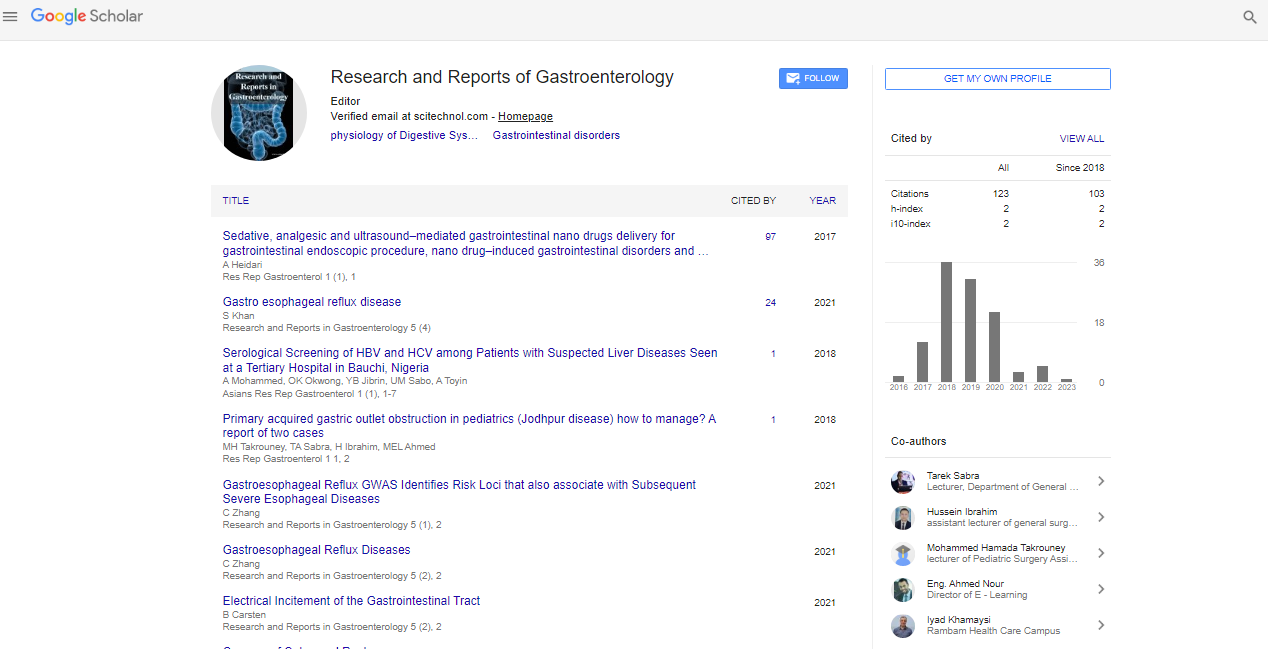Commentary, Res Rep Gastroenterol Vol: 7 Issue: 1
Indications and Options in Intestinal Crohn's Disease
Steve Peter*
Department of Radiopharmacy, Ghent University, Ghent, Belgium
*Corresponding author: Steve Peter
Department of Radiopharmacy, Ghent University, Ghent, Belgium
Email: peter_s@med.be
Received date: 20 February, 2023, Manuscript No. RRG-23-97818;
Editor assigned date: 22 February, 2023, PreQC No. RRG-23-97818 (PQ);
Reviewed date: 08 March, 2023, QC No. RRG-23-97818;
Revised date: 15 March, 2023, Manuscript No. RRG-23-97818 (R);
Published date: 23 March, 2023, DOI: 10.4172/Rrg.1000130
Citation: Peter S (2023) Indications and Options in Intestinal Crohn's Disease. Res Rep Gastroenterol 7:1.
Description
Crohn's disease is an inflammatory bowel disease that primarily affects the small and large intestines. It is a chronic condition that can cause abdominal pain, diarrhea, and other symptoms that can significantly impact a patient's quality of life. While there is no cure for Crohn's disease, there are a variety of treatment options available to help manage the disease and improve symptoms.
Crohn's disease can affect different parts of the digestive tract, from the mouth to the anus. The symptoms of the disease can vary depending on the location and severity of the inflammation. Common symptoms include abdominal pain, diarrhea, fever, and weight loss. In some cases, Crohn's disease can cause complications such as strictures, fistulas, and abscesses.
When a patient presents with symptoms of Crohn's disease, a physician will typically perform a physical exam, review the patient's medical history, and order diagnostic tests such as blood tests, stool tests, and imaging studies. A definitive diagnosis of Crohn's disease is usually made with a combination of these tests and a biopsy of the affected tissue.
The goal of treatment for Crohn's disease is to reduce inflammation, control symptoms, and prevent complications. There are several treatment options available, including medications, surgery, and lifestyle changes.
The most commonly used medications for Crohn's disease are anti- inflammatory drugs, immunomodulators, and biologics. Anti-inflammatory drugs such as corticosteroids and aminosalicylates can help reduce inflammation in the intestines and relieve symptoms. However, these drugs are not suitable for long-term use due to their potential side effects.
Immunomodulators such as azathioprine, methotrexate, and cyclosporine can help suppress the immune system and reduce inflammation. These drugs are often used in combination with other medications to achieve better control of symptoms.
Biologics such as infliximab, adalimumab, and vedolizumab are antibodies that target specific proteins in the immune system that are involved in inflammation. Biologics can be highly effective at reducing inflammation and improving symptoms, but they can also increase the risk of infections and other side effects.
Surgery may be necessary for patients with Crohn's disease who do not respond to medications or who develop complications such as strictures, fistulas, or abscesses. The most common surgical procedure for Crohn's disease is bowel resection, which involves removing the affected portion of the intestine and rejoining the healthy segments.
In addition to medications and surgery, lifestyle changes can also help manage Crohn's disease. Patients may need to modify their diet to avoid foods that trigger their symptoms, such as spicy or high-fiber foods. Some patients may also benefit from nutritional supplements or specialized diets such as the low-FODMAP diet.
Other lifestyle changes that can help manage Crohn's disease include regular exercise, stress management, and smoking cessation. Exercise can help improve overall health and reduce stress, while stress management techniques such as meditation and yoga can help reduce the impact of stress on the body. Smoking has been shown to exacerbate Crohn's disease, so quitting smoking is an important step for patients with the disease.
Crohn's disease is a chronic condition that can significantly impact a patient's quality of life. While there is no cure for Crohn's disease, there are several treatment options available to help manage the disease and improve symptoms. Medications such as anti-inflammatory drugs, immunomodulators, and biologics can help reduce inflammation and control symptoms, while surgery may be necessary for patients who do not respond to medications or who develop complications. Lifestyle changes such as diet modification, exercise, stress management, and smoking cessation.
 Spanish
Spanish  Chinese
Chinese  Russian
Russian  German
German  French
French  Japanese
Japanese  Portuguese
Portuguese  Hindi
Hindi 